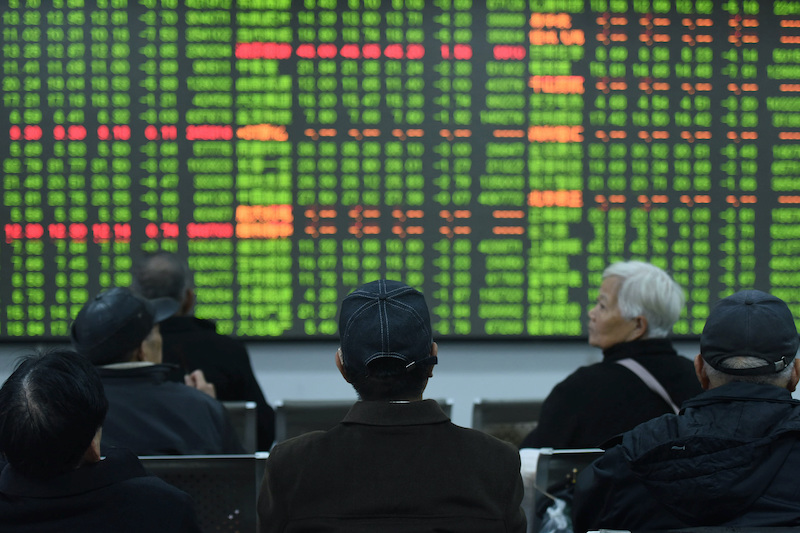Asia’s stock markets began the week on the front foot buoyed by China’s moves to roll back some of its strict Covid curbs.
Investors hope the steps being taken to unwind pandemic restrictions in China will eventually brighten the outlook for global growth and commodity demand.
That bump was felt less keenly in Japan though the Nikkei index did close slightly higher, led by its heavyweight technology stocks.
Read more: China Seen Announcing Steps to Ease Covid Curbs on Wednesday
The Nikkei share average edged up 0.15% to close at 27,820.40, while the broader Topix was down 0.31% to 1,947.90.
Fast Retailing jumped 3.11% and gave the biggest boost to the Nikkei after the clothing store operator last week said average purchases per customer rose 6.5% in November.
More Chinese cities announced an easing of coronavirus curbs on Sunday as Beijing tries to make its zero-Covid policy less onerous after recent unprecedented protests against restrictions.
There were also reports Beijing might lower the threat classification for Covid-19 and that lifted the mood in Hong Kong where the Hang Seng Index surged 4.51%, or 842.94 points, to 19,518.29.
“While the easing of some restrictions does not equate to a wholesale shift away from the dynamic Covid zero strategy just yet, it is further evidence of a shifting approach and financial markets look to be firmly focussed on the longer term outlook over the near-term hit to activity as virus cases look set to continue,” said Taylor Nugent, an economist at NAB.
Chinese blue chips gained 1.1%, on top of last week’s 2.5% bounce. The Shanghai Composite Index rose 1.76%, or 55.67 points, to 3,211.81, while the Shenzhen Composite Index on China’s second exchange was up 0.88%, or 18.03 points, to 2,062.63.
Oil Prices Firm
Elsewhere across the region, South Korea stocks gained 0.3% while Indian stocks were up too with Mumbai’s signature Nifty 50 index rising 0.03%, or 4.95 points, to close at 18,701.05.
MSCI’s broadest index of Asia-Pacific shares outside Japan added 1.2%, after rallying 3.7% last week to a three-month top.
Globally, China’s moves to ease back on its Covid curbs helped oil prices firm as OPEC+ nations reaffirmed their output targets ahead of a European Union ban and price caps on Russian crude, which begin on Monday.
EUROSTOXX 50 futures added 0.1%, while FTSE futures were flat. S&P 500 futures and Nasdaq futures both fell 0.1%.
Wall Street had lost some momentum on Friday after November’s robust US payrolls report challenged hopes for a less aggressive Federal Reserve, though Treasuries still ended last week with solid gains.
Indeed, 10-year note yields have fallen 74 basis points since early November, effectively undoing much of the tightening of the Fed’s last outsized increase in cash rates.
Markets are wagering Fed rates will top out at 5% and the European Central Bank around 2.5%. The Fed next meets on December 14 and the ECB the day after.
Central banks in Australia, Canada and India are all expected to raise their rates at meetings this week.
The steep decline in US yields has taken a toll on the dollar, which fell 1.4% last week on a basket of currencies to its lowest since June.
It lost 3.5% on the yen alone and last traded at 134.24, leaving October’s peak of 151.94 a distant memory.
Key figures
Tokyo – Nikkei 225 > UP 0.15% at 27,820.40 (close)
Hong Kong – Hang Seng Index > UP 4.51% at 19,518.29 (close)
Shanghai – Composite > UP 1.76% at 3,211.81 (close)
London – FTSE 100 > UP 0.21% at 7,571.89 (0940 GMT)
New York – Dow > UP 0.10% at 34,429.88 (Friday close)
- Reuters with additional editing by Sean O’Meara
Also on AF:
Asia Braces for Wall St Shockwave as Banks’ Fears Deepen
China Services Activity Sinks to 6-Month Low: Caixin
























